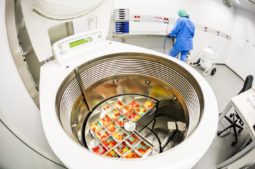Anyone starting out on a cycle of IVF fertility treatment is prepared for it to be stressful, and understanding the stages of the process and what’s happening each step of the way can help to alleviate this. You may expect that the long-awaited day when the embryo is transferred back to your uterus is the end of the process, whose last stage is the two-week wait before you can take the blood test to confirm whether you are pregnant.
Some of our patients tell us that this is the most stressful time of all because the previous few weeks have been filled with activities; now all there is do is wait for the time to pass. Again, knowing what to expect, and being prepared, can help. Here are our top ten tips for coping with the two-week wait after IVF.
1. Understand the reasons for the two-week wait after IVF
After embryo transfer, it can take around 10 days for the human chorionic gonadotropin (hCG) injection, which is given to trigger maturing and release of the eggs, to clear from your bloodstream. This is why a pregnancy test taken too early can easily deliver a false result. It takes a number of days for the embryo to implant and when this occurs, your body starts to produce its own hCG with the amount reaching a detectable level 14 days after transfer.
2. Cramping: should I be worried?
Try not to obsess about every little pang or twinge. Some amount of slight cramping or even blood spotting can result from the treatment you’ve been through. They can also be indications that implantation is taking place. You really have no way of knowing at this stage. Try to accept that this is perfectly normal, but that the absence of cramping and spotting is also perfectly normal.
3. Rest, but not too much
It used to be common practice for doctors to recommend complete bed rest during the two weeks after embryo transfer, but there’s no evidence that this is helpful. Treat yourself gently and avoid heavy lifting and strenuous exercise. Do take time off work if your job is physical or stressful but it’s fine to go about your normal daily activities.
4. Sex after embryo transfer
It may be difficult because this is a time when you need comfort and closeness with your partner, but most fertility doctors advise against sexual intercourse during these two weeks. This is because there could be a small risk of infection, and in any case, your cervix and uterus also need a period of rest.
5. Keep busy
Once you know the two-week wait after IVF is inevitably going to involve some anxiety, planning a schedule of fun things to do could be part of your strategy for passing the time. Fill your diary with relaxing events. A date night with your partner, watch a film or even a series at home, schedule in a day of doing those little jobs around the house that you keep putting off – anything that doesn’t involve too much thinking and passes the time pleasantly is good news.
6. Talk daily about your feelings
Embracing the inevitability of worry is a way of keeping it under control. On your own or with a trusted friend or your partner, you can have a regular time each day to review how you’re feeling, both mentally and physically. When your 15 or 30 minutes of reflection time is up, let it go and continue with your day. If you feel the need to worry, there’s always tomorrow!
7. Reach out for support during your two-week wait
We’re sure you know you’re not alone. Around 25 million people throughout Europe face fertility problems. Now is the time to access the support you need from people who really understand what you’re going through. As a result of the infertility that led you to have treatment in the first place, you may already have found groups or forums in your area. If not, and you need to find a group for the first time, Fertility Europe has a directory of member organisations in Europe which can help you to locate a support group.
8. Practise relaxation techniques
There are lots of ways to deal with stress and anxiety, and it’s well worth thinking about which of them you feel most comfortable with. You could dedicate a few minutes each day to breathing exercises, meditation or yoga. Reviving any hobbies can also be therapeutic at a time like this. Knitting or any other hands-on craft can be a real help by focusing your mind on the immediate moment.
9. Eat a healthy diet
A healthy diet is always a good option of course, not only during your two-week wait after IVF treatment, but it’s especially important now. Your body needs this both to recover from the stresses of the hormonal treatment you’ve had and to be in the best possible health to support a successful pregnancy. It can help you to feel optimistic if you treat your diet as though you are already pregnant. This doesn’t mean ‘eating for two’ but it means making sure you consume plenty of fruit and vegetables along with protein and carbohydrates. And while there’s nothing wrong with the occasional indulgence, try to go easy on the sweet treats!
10. Stay optimistic, but realistic
With IVF treatments there are no 100% guarantees, and some cycles are not successful. Just bear in mind that you may need to keep trying. But we can give you plenty of reasons to be hopeful when you come to an IVI clinic for your fertility treatment. Nine out of ten patients who consult us with fertility problems achieve their goal of becoming parents.
If you would like to talk to us about your fertility situation or any fertility treatment, just get in touch with us at IVI. Stay optimistic!





Comments are closed here.